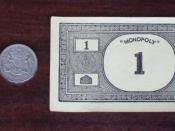How Money Changes The Way We Think And Behave
The term "affluenza" -- a portmanteau (blending of two or more forms) of affluence and influenza, defined as a "painful, contagious, socially transmitted condition of overload, debt, anxiety, and waste, resulting from the dogged pursuit of more" -- is often dismissed as a silly buzzword created to express our cultural disdain for consumerism. Though often used in jest, the term may have more truth than many of us would like to think.
Affluenza was even used as a defense in a recent, highly publicized drunk driving trial in Texas, where a 16-year-old boy claimed that his family's wealth should exempt him from responsibility for the deaths of four people. The boy got off with 10 years' probation and therapy (which his family will pay for), angering many for what they saw as the law's unfair leniency.
Psychologist G. Dick Miller, who acted as an expert witness for the defense, argued that the boy was suffering from affluenza, which may have kept him from comprehending the full consequence of his actions.
"I wish I had not used that term," Miller later told CNN. "Everyone seems to have hooked on to it."
Whether affluenza is real or imagined, money really does change everything, as the song goes -- and those of high social class do tend to see themselves much differently than others. Wealth (and the pursuit of it) has been linked with immoral behavior -- and not just in movies like The Wolf of Wall Street. Psychologists who study the impact of wealth and inequality on human behavior have found that money can powerfully influence our thoughts and actions in ways that we're often not aware of, no matter our economic circumstances. Although wealth is certainly subjective, most of the current research...


